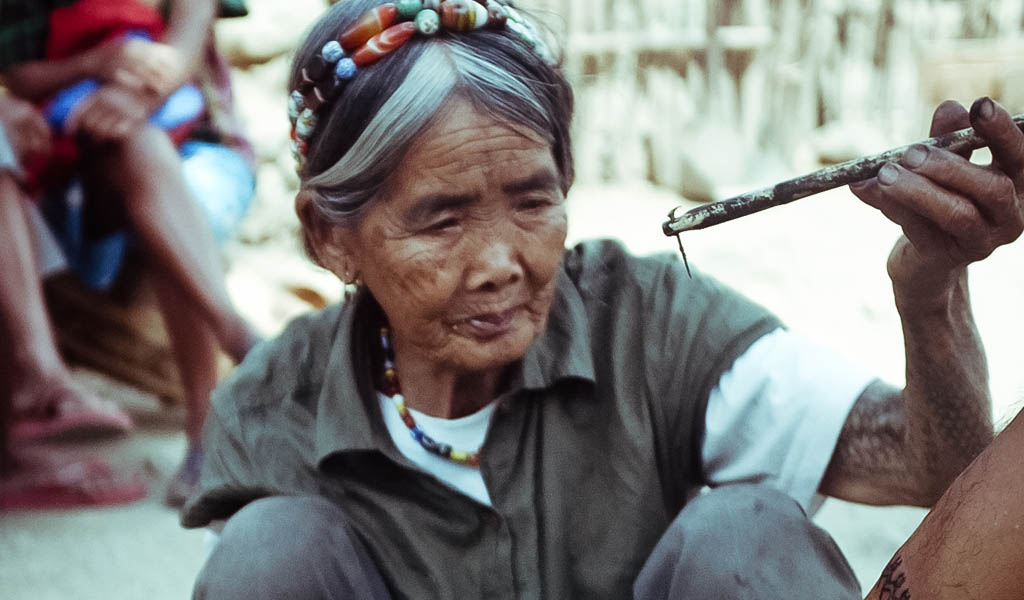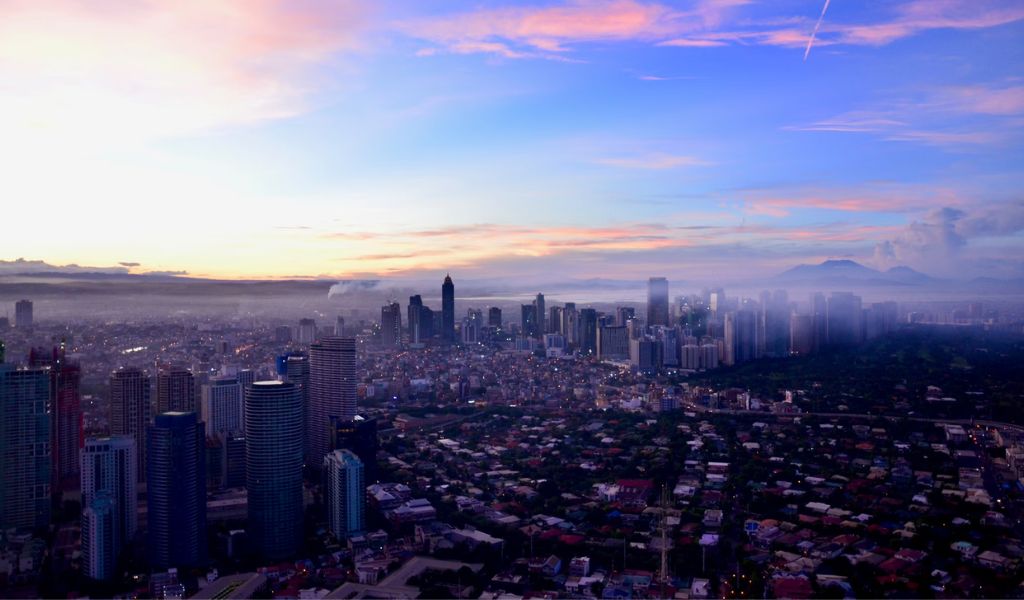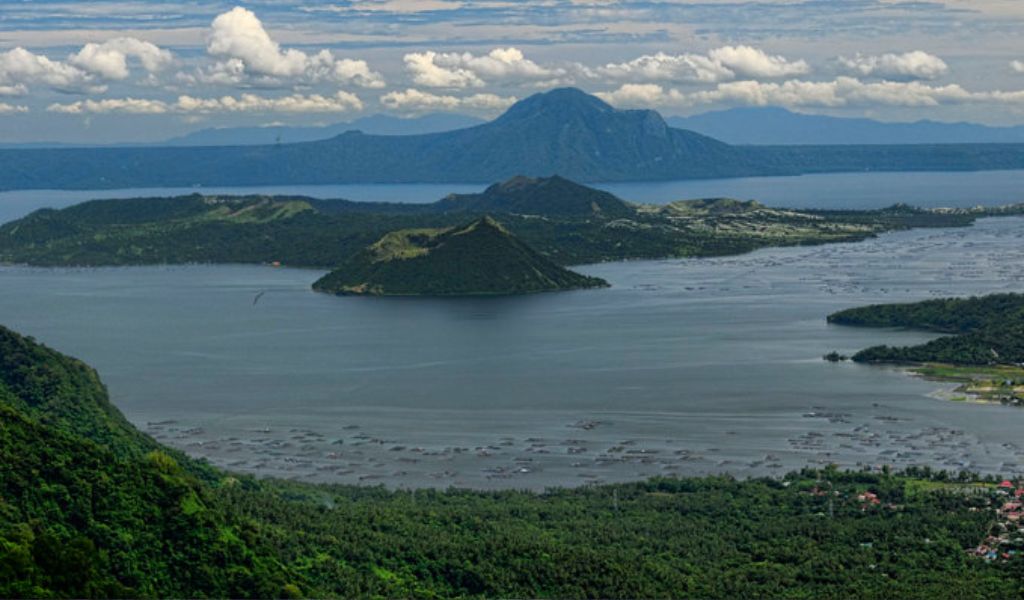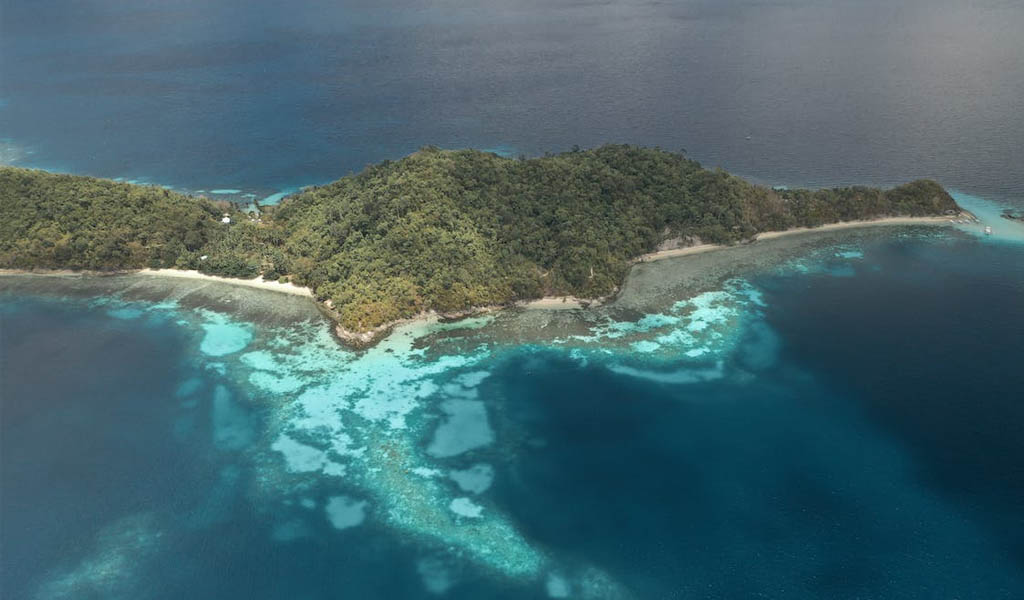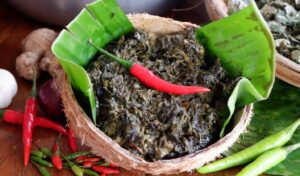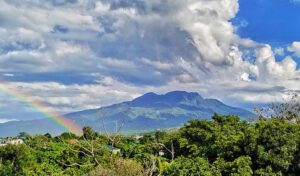Introduction – The Mambabatok of Kalinga Apo Whang-Od
Apo Whang-Od, the legendary Mambabatok of Kalinga, stands as a living testament to the rich cultural heritage and traditional tattooing practices of the Philippines. Born in the mountain village of Buscalan, Kalinga, she is the oldest and last traditional Kalinga tattoo artist, also known as a mambabatok, who has been practicing the ancient art of hand-tapped tattoos for over eight decades. Using a simple bamboo stick, a thorn, and a mixture of soot and water, Whang-Od has created intricate and symbolic designs that tell the stories of the Kalinga people, their history, and their bravery.
Her tattoos, once reserved for warriors and women of stature, have now become a symbol of cultural pride and identity, attracting both locals and international visitors eager to receive a piece of living history. At over 107 years old, Whang-Od continues to tattoo, ensuring the survival of this unique cultural tradition, while also passing her knowledge to younger generations, preserving the legacy of the mambabatok for years to come. Here are ten fascinating facts about Apo Whang-Od and the ancient art of mambabatok that you probably didn’t know.
The Last Traditional Kalinga Tattoo Artist
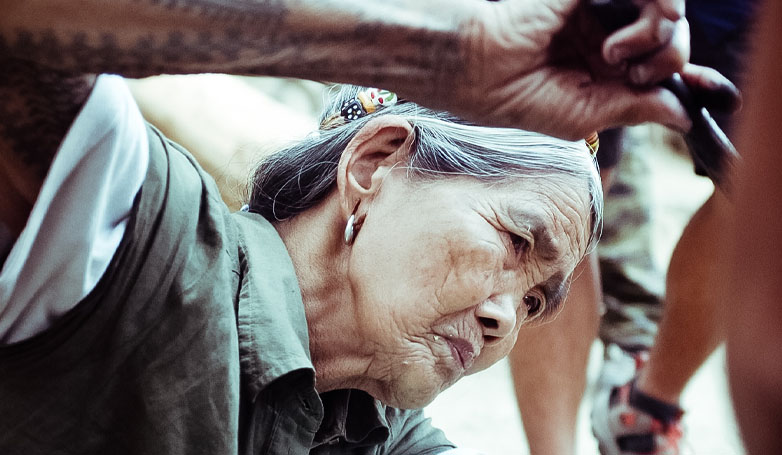
Apo Whang-Od, often hailed as the last traditional Kalinga tattoo artist, embodies the enduring spirit and cultural richness of the Kalinga people. Residing in the remote village of Buscalan in the mountainous province of Kalinga, Philippines, she has been practicing the ancient art of hand-tapped tattoos for over eight decades. Utilizing traditional tools such as a bamboo stick, a thorn, and a mixture of soot and water, Whang-Od creates intricate and meaningful designs that serve as visual narratives of bravery, beauty, and identity.
Her tattoos, once a privilege reserved for warriors and women of high status, have now become a cherished symbol of cultural heritage, drawing enthusiasts from around the world. Despite being over 107 years old, Whang-Od remains dedicated to her craft, ensuring the preservation of this unique art form by teaching it to the younger generation, thereby securing the future of Kalinga’s tattooing legacy.
Tattooing with Nature’s Tools
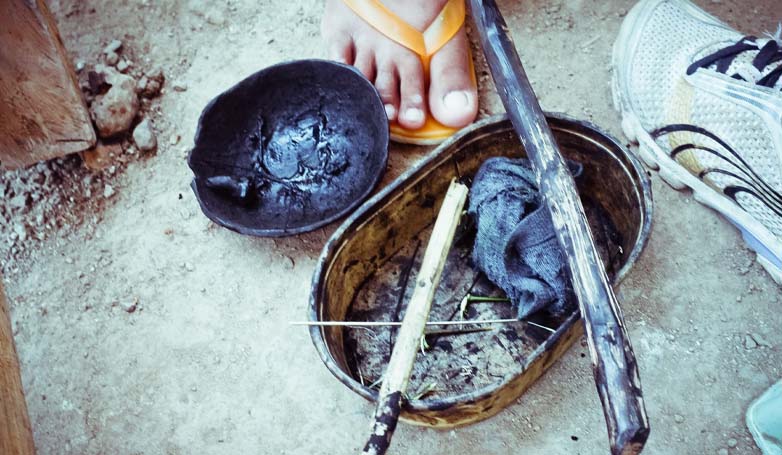
Apo Whang-Od, the last traditional Kalinga tattoo artist, continues to practice the ancient art of hand-tapped tattoos using nature’s tools. In the remote village of Buscalan in the Kalinga province of the Philippines, Whang-Od creates her intricate designs with a bamboo stick, a thorn from a pomelo tree, and a mixture of soot and water. This method, passed down through generations, reflects a deep connection to nature and tradition.
Each tattoo tells a story, symbolizing bravery, beauty, and cultural identity, and is applied with a rhythm and precision honed over her eight decades of experience. Whang-Od’s use of these natural tools not only preserves the authenticity of Kalinga tattooing but also highlights the resourcefulness and ingenuity of her ancestors, ensuring that this unique cultural heritage endures in its purest form.
Symbolism in Every Stroke
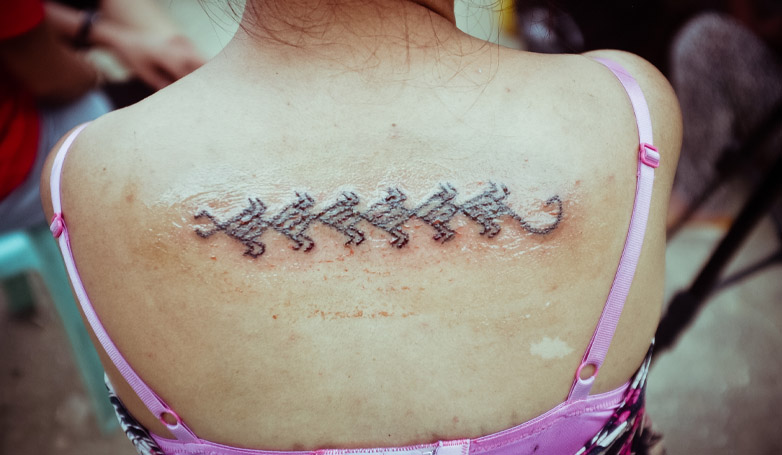
In the hands of Apo Whang-Od, the last traditional Kalinga tattoo artist, every stroke of her bamboo stick and thorn carries profound symbolism. Each tattoo she crafts is a carefully chosen design that conveys deep meanings rooted in the Kalinga culture, representing values such as bravery, strength, and identity. These symbols passed down through generations, tell stories of the wearer’s life, their community, and their connection to their ancestors.
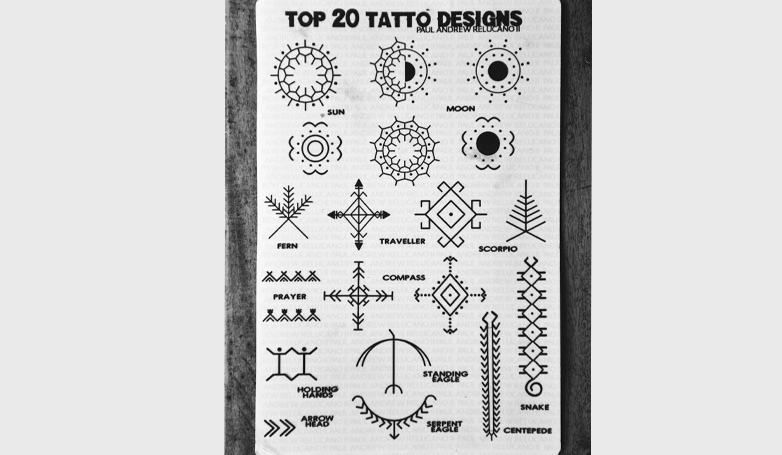
Using a mixture of soot and water, Whang-Od creates intricate patterns that are not just decorative but serve as a living testament to the rich history and spiritual beliefs of the Kalinga people. Her work, therefore, is not merely an art form but a visual narrative imbued with cultural significance, preserving and celebrating the heritage of her people with every precise and meaningful stroke.
The Apprenticeship Tradition
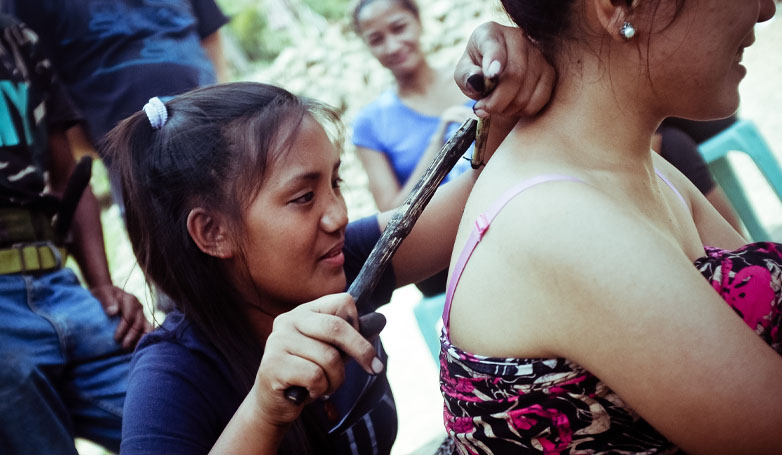
Apo Whang-Od, the last traditional Kalinga tattoo artist, is committed to preserving the ancient art of tattooing through the apprenticeship tradition. In her remote village of Buscalan, Whang-Od has taken it upon herself to pass down her skills and knowledge to younger generations, ensuring that this unique cultural heritage does not vanish with her. She teaches her apprentices, including her grandnieces, the meticulous techniques and deep symbolic meanings behind each tattoo design.
This traditional apprenticeship is more than just learning an art form; it is a profound cultural education that encompasses the history, values, and spiritual beliefs of the Kalinga people. Through this intergenerational transfer of knowledge, Whang-Od is safeguarding the future of Kalinga tattooing, fostering a sense of pride and continuity, and ensuring that the legacy of the mambabatok endures.
A Tattoo as a Rite of Passage
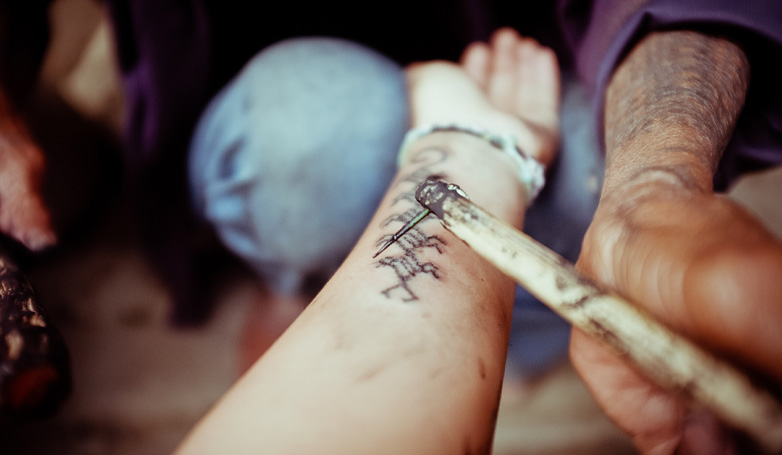
In the Kalinga culture, tattoos by Apo Whang-Od and other mambabatok are not just body art; they are powerful markers of life’s milestones. Each design etched into the skin signifies an important event or achievement, from rites of passage such as coming of age and marriage to acts of bravery and significant contributions to the community. These tattoos serve as visual records of personal and communal histories, celebrating the individual’s journey and their role within the larger tapestry of Kalinga society.
The intricate patterns and symbols, chosen carefully for their meanings, are deeply interwoven with the wearer’s identity and status. By marking these milestones, Whang-Od preserves not only the tradition of Kalinga tattooing but also the stories and legacies of her people, ensuring they are remembered and honored through generations.
A Global Icon
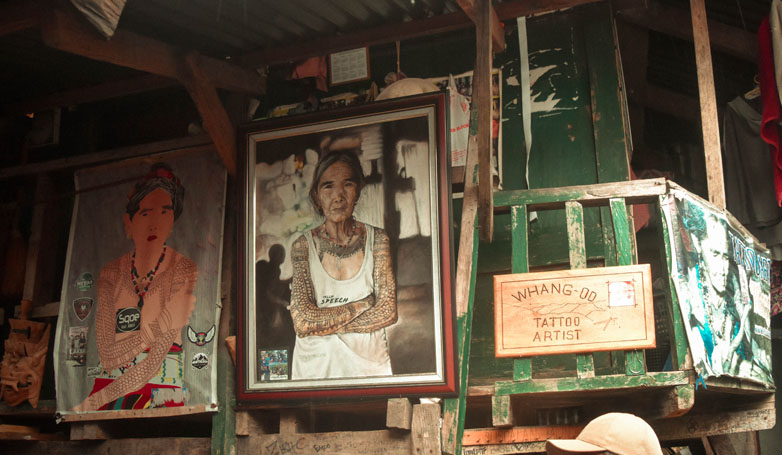
Apo Whang-Od, the last traditional Kalinga tattoo artist, has brought the ancient art of Kalinga tattooing from the secluded mountains of Buscalan to the global stage. Her intricate, hand-tapped tattoos, created using a bamboo stick, thorn, and soot, have captivated the world with their beauty and cultural significance. Visitors from around the globe now journey to her remote village, eager to receive a tattoo that embodies the rich heritage and stories of the Kalinga people.
This global interest has not only highlighted the artistry and symbolism behind each design but also emphasized the importance of preserving indigenous traditions. By sharing her craft with the world, Whang-Od has become a cultural ambassador, fostering a deeper appreciation and respect for Kalinga culture and ensuring that this unique and ancient art form continues to thrive in the modern era.
Recognition and Awards
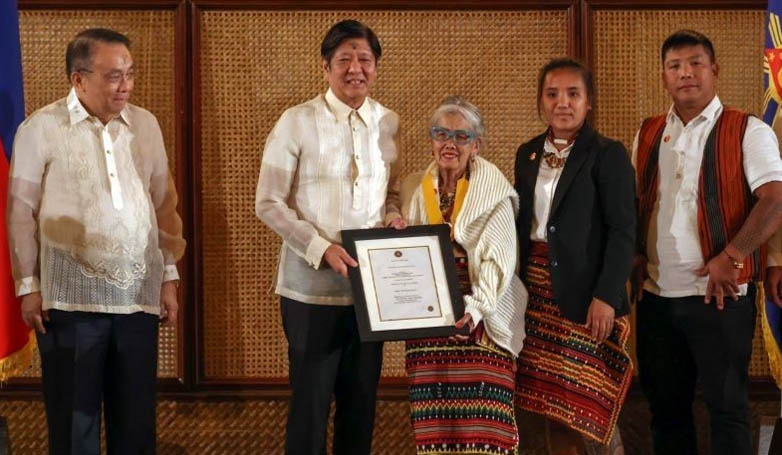
Apo Whang-Od, the last traditional Kalinga tattoo artist, has received widespread recognition and numerous awards for her dedication to preserving the ancient art of hand-tapped tattoos. Her remarkable contributions have earned her national and international acclaim, including prestigious cultural and heritage awards that celebrate her role in keeping the Kalinga tattoo tradition alive. Notable recognitions include the Dangal ng Haraya Award for Intangible Cultural Heritage from the National Commission for Culture and the Arts in the Philippines.
These honors not only acknowledge her exceptional skill and artistry but also her commitment to passing down her knowledge to future generations. Through these accolades, Whang-Od’s legacy is cemented, and the cultural significance of her work is celebrated on a global scale, inspiring pride and admiration for the rich traditions of the Kalinga people.
Enduring the Test of Time
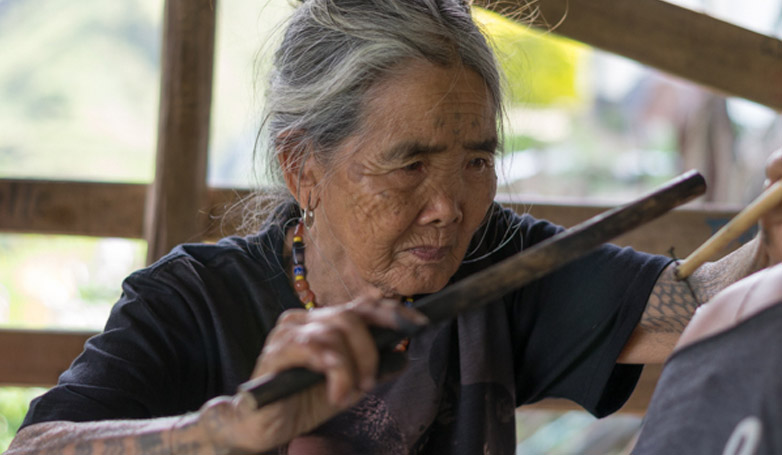
Despite being over 107 years old, she continues to practice the ancient art of hand-tapped tattooing with unwavering precision and vigor. In her remote village of Buscalan, Whang-Od rises each day to meet the influx of visitors who travel from around the world to receive a piece of living history inked onto their skin. Her resilience and dedication defy the conventional expectations of aging, proving that passion and purpose can transcend time. Through her enduring work, Whang-Od not only preserves a vital aspect of her cultural heritage but also serves as a powerful inspiration, demonstrating that age does not limit one’s ability to contribute meaningfully to their community and the world.
The Cultural Experience
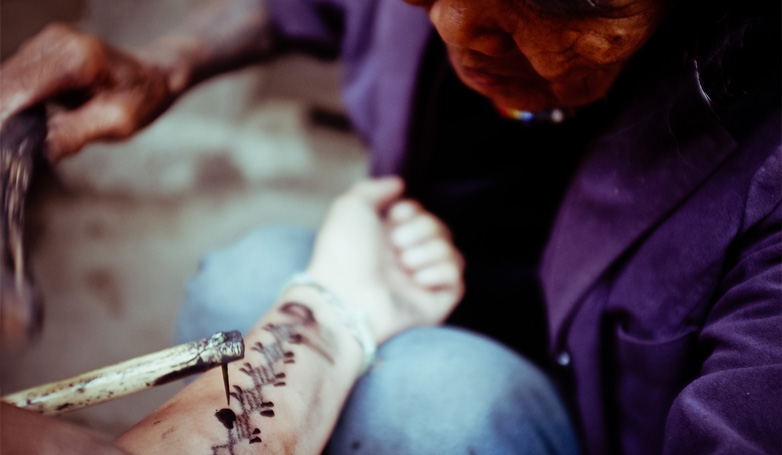
Apo Whang-Od’s tattoos are more than just body art; they are profound cultural symbols that carry deep significance within the Kalinga tradition. Each design, meticulously hand-tapped using traditional tools, represents a rich tapestry of meanings that go beyond aesthetics. These tattoos tell stories of personal achievements, rites of passage, and communal values, linking the wearer to their ancestors and cultural heritage. The intricate patterns not only reflect the individual’s personal journey but also honor the collective history and spiritual beliefs of the Kalinga people. Whang-Od’s work is a living testament to the enduring legacy of her community, offering a powerful connection to the past and a means of preserving and celebrating the rich traditions of Kalinga for future generations.
Inspiring Future Generations
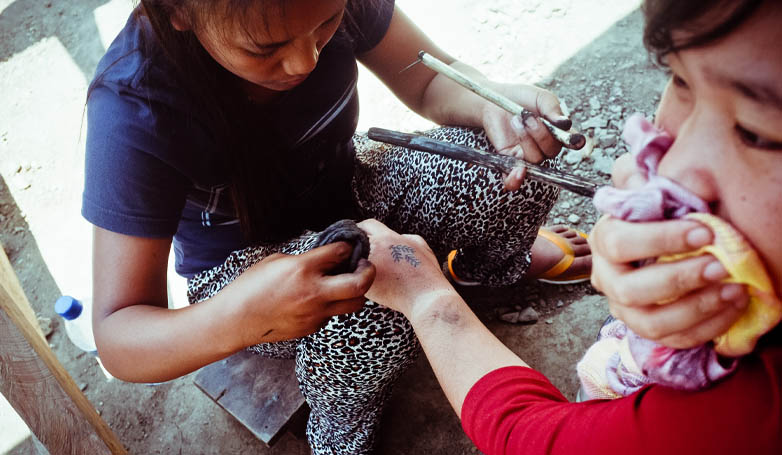
Apo Whang-Od’s life and work embody a legacy of resilience that transcends the boundaries of time and tradition. As the last traditional Kalinga tattoo artist, her unwavering dedication to preserving the ancient art of hand-tapped tattoos reflects her remarkable strength and commitment. Despite the challenges of modernity and the encroachment of global influences, Whang-Od has steadfastly maintained the traditional techniques and cultural significance of Kalinga tattooing.
Her ability to adapt while staying true to her roots demonstrates a profound resilience, ensuring that this unique art form continues to thrive. By passing down her knowledge to younger generations and continuing to practice well into her centenarian years, Whang-Od has created a lasting legacy that not only honors the past but also inspires future custodians of this cherished cultural heritage.
Conclusion
In conclusion, Apo Whang-Od’s extraordinary journey as the last traditional Kalinga tattoo artist stands as a powerful testament to the resilience and richness of cultural heritage. Her commitment to preserving the ancient art of hand-tapped tattoos amidst the modern world’s rapid changes highlights the profound significance of tradition and identity. Through her meticulous craftsmanship, she not only maintains the intricate symbolism embedded in each design but also ensures that the stories and values of the Kalinga people endure.
Whang-Od’s legacy is a beacon of cultural pride, resilience, and continuity, inspiring admiration and respect globally. As she passes her knowledge to future generations, her work transcends the realm of body art, becoming a living archive of history, identity, and unwavering dedication to preserving a precious cultural tradition. In addition, if you are looking for a destination in Cordillera, you must try to visit this Ultimate Sagada Travel Guide.
FAQs About Mambabatok of Kalinga Apo Whang-Od
1. Is it necessary to book in advance to get a tattoo?
Yes, it is advisable to book in advance, as Apo Whang-Od’s time is limited, and many visitors come to Buscalan specifically to receive her tattoos. It’s best to contact local guides or visit during festivals when she may have more availability.
2. How much does a tattoo from Apo Whang-Od cost?
The cost of a tattoo from Apo Whang-Od varies depending on the size, complexity, and design of the tattoo. Generally, prices range from PHP 1,000 to PHP 10,000 (approximately USD 20 to USD 200). Larger and more intricate designs may cost more.
3. Are there any health risks associated with batok?
As with any form of tattooing, there are potential health risks, including infection and allergic reactions. However, Apo Whang-Od and her apprentices follow traditional hygiene practices to minimize these risks. It’s important for visitors to ensure that proper sanitation procedures are followed.
4. What kind of preparation is needed before receiving a batok tattoo?
Before receiving a batok tattoo, visitors should be in good health, understand the cultural significance of the tattoo, and be ready for the physical sensations involved in the traditional tattooing process. It’s also important to follow any guidelines provided by Apo Whang-Od or her apprentices.

